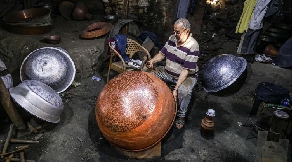 A coppersmith makes a vessel at a workshop in Cairo, Egypt, on August 13, 2023
A coppersmith makes a vessel at a workshop in Cairo, Egypt, on August 13, 2023
In one of the narrow alleys of the Al-Jamaliya neighbourhood in Old Cairo, 65-year-old coppersmith Abdel-Nabi Hindawi was making a copper pot at his workshop amid an intense heat wave.
The Egyptian artisan, who has been in the business for about 40 years, is struggling to save both his shabby workshop and his endangered profession from extinction.
"Beaten copper work is one of the oldest crafts in Egypt ... this neighbourhood has hosted many coppersmiths' workshops throughout history, but only a few of them still exist today," said Hindawi.
"Out of copper sheets, I can beautifully create cookware, pots, vases, bowls, mosque top minaret decorations, domes, home decoration, and other forms of art," said Hindawi as he pounded his hammer on a large bowl for candy makers.
"The area used to be buzzing with coppersmith workshops, but the workshops are fading as the craftsmen of my generation retire or pass away," said Hindawi, who had inherited the trade from his father.
According to him, the younger generations favour quick money and white-collar jobs over traditional skills and are unwilling to enter a trade with a declining market, making it difficult for his profession to survive. In addition, high prices in global copper market have slashed consumer demand and weighed on the business prospect.
"The hike in copper cost has led many craftsmen to search for more profitable jobs. Some others replaced copper with cheaper metal sheets in making their products, which outcompete copper items," Hindawi explained.
According to him, customers now prefer to buy cheaper items made of inexpensive materials such as plastic, aluminium, and fiberglass, a trend that has dramatically hurt coppersmiths' businesses.
Not far away from Hindawi's workshop, dozens of shops showcased copper antiques, decorations and souvenirs at the centuries-old Khan el-Khalili tourist market in Old Cairo.
Instead of crafting pots and kitchenware, Hossam al-Askari, a renowned Egyptian copper artisan in his fifties, introduced an innovative approach to the craft. "My family has been in the copper industry for more than 70 years ... coppersmithing is more than a craft for me," said al-Askari, who is now a manager and owner of a copperware company.
While al-Askari's ancestors adopted an old style of making kitchenware and large decorations, he decided to elevate the craftsmanship to the level of an art. "Art is limitless and I try to apply every new creative thought to develop this artistic craft," said al-Askari as he sat on a desk surrounded by assorted copper antiques at his shop.
Al-Askari makes ornaments, home decorations, engraved pots and vases, photo frames, and many other antiques, all in an artistic form. He said he mainly relied on tourist purchases. Echoing Hindawi, al-Askari said that the craft is dying because of rising raw material costs and a shortage of skilled craftsmen.
"If the government does not take heed of these obstacles, copper smithing will vanish within years," al-Askari warned, adding that he is ready to help keep the craft alive by teaching new generations at his company and workshops.
"The government has helped us by organizing many local and international fairs around the year to showcase and sell our products ... and I think it should start vocational education programs and schools for young people. This will definitely save the craft," al-Askari added.